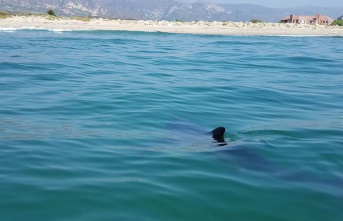Ivan Rusev is a scientist and director of the Tuzly Estuaries National Nature Park, a 280 square kilometer protected area in the Bessarabia region of south-western Ukraine. His daily task: to walk along the beach of the Black Sea coast in search of dead dolphins. The stretch of beach is actually 44 kilometers long, and last year Rusev picked up three dead marine mammals there. Now that Russia is razing parts of Ukraine to the ground, Rusev can only walk five kilometers. However, the number of dead animals has increased almost twelvefold: at the end of August, Rusev counted 35 dead marine mammals.
And that's just a fraction of the animals that died in the Russian invasion. In the summer, scientists warned of "thousands" of dead dolphins. There are also pets that could not be saved. Or farm animals that died in their stables under the hail of bombs or starved to death for lack of food. The animals are not the only ones to suffer.
For the Ukrainian nature, the war is a single disaster. Forests, water bodies, swamps and nature reserves have been affected at least as much as cities and energy infrastructure since February 24th - with the difference that the environment ends up on the list of forgotten victims of war faster. A development that concerns environmental activists in particular. "Most people pay attention to the loss of life and damage to infrastructure, but many people and even the national government forget about losses and damage inflicted on the environment," the Guardian quoted a Ukrainian activist as saying.
However, the local authorities do not care about nature conservation at all. At the climate summit in Egypt, Volodymyr Zelenskyy appealed to the world community that one could not afford another shot for the climate. The Ukrainian Ministry of the Environment has so far counted over 2,000 cases of environmental destruction. According to the environmental organization WWF, about three million hectares of forest are affected by the fighting. This corresponds to a third of all Ukrainian forests. 20 percent of the nature reserves are also affected.
The area or ecosystem affected differs by region. A WWF spokesman told stern that in the north of Ukraine it was primarily forests and swamps that were affected, while in the south, especially in the regions around Cherson and Zaporizhia, steppe and marine ecosystems were particularly affected. However, it is unclear how many wild animals died in the fighting. "Experts would have to go to the combat zones to conduct on-site surveys. That's not possible at the moment," the WWF said.
The non-professional organization Ukraine Nature Conservation Group (UNCG), a group of scientists and activists, provides concrete figures. They assume that 20 species living in the Ukrainian steppe will disappear because of the war.
In a preliminary report, the United Nations also addressed the environmental destruction in the Ukraine war. But there, too, there is a massive lack of detailed information. Even the organization Greenpeace does not currently have anything concrete to report. Not yet, because a report on the environmental consequences of the war in Ukraine is to be published by the new year 2023, as a spokeswoman told stern.
It is also currently unclear whether the destruction of nature is collateral damage or a Russian tactic. The organizations WWF and Greenpeace assume that these are tragic consequences of the war. They don't want to see a targeted tactic in it. At least that is what international law says. Both an additional protocol to the Geneva Convention and the so-called Environmental Warfare Convention prohibit warfare techniques that cause long-term damage to the environment. Russia and Ukraine have also signed the contract.
On the other hand, Putin and his troops have not shied away from war crimes. Targeted attacks on nature would also fit into Russian war tactics, according to which Moscow is trying to make Ukraine uninhabitable. Ukrainian activists therefore speak not only of an "ecocide". They see these "environmental crimes" as part of Russia's "genocidal war." Because the natural damage has a direct impact on the living space of the Ukrainians.
"The effects of war on nature can range from permanent pollution to the loss of soil fertility and people's livelihoods to the destruction of entire ecosystems," wrote Ukrainian environmental expert Dmytro Averin in the Green European Journal in July.
The best example is the east of the country, whose waters have been contaminated with harmful substances from the local industry since the fighting in 2014. The WWF is concerned about the Siversky Donets, a tributary of the Don, which has its source in Russia. The Siversky Donets crosses a region characterized by coal mines, chemical plants and the metal industry. The Donbas Water Company gets 80 to 85 percent of its water from the Siversky Donets and its tributaries.
But the water in the entire region has been contaminated since 2014. The reason for this is the coal mines, which were flooded in the course of the military conflicts and thus contaminated the local waters with toxic substances. According to the WWF, more than six million Ukrainians have no or only limited access to clean drinking water.
The weapons also endanger the ecosystems, either because trees fall over from the fire or entire forests are burned down by explosions. Toxic metals or spilled oil are particularly problematic for water bodies. "Rivers suffer the most from artillery fire, because during the attacks, pieces of military equipment fall into the water and contaminate it," explains the WWF spokesman. According to WWF estimates, it may take "up to hundreds of years" for nature to recover from the conflict.
Another problem child: the region around the Zaporizhia nuclear power plant. The International Energy Agency (IEA) in particular has advocated demilitarization of the zone in order to prevent a catastrophe like that in Chernobyl. The Russian occupiers have not yet been persuaded to do so, but in an interview with Stern, Greenpeace is optimistic that this will soon change.
However, this positive attitude cannot hide what this war is costing and will continue to cost Ukraine. The bill for the environmental damage is already long - also financially. In October, Ukraine estimated that war damage to the environment would cost up to 36 billion euros. The government expects 25 billion euros for air pollution, another 11.4 billion could be added to eliminate the devastation of the soil.
Ukrainian activists are therefore calling for Russia to be held accountable for its crimes against nature.
"War is a terrible thing," says scientist Ivan Rusev. In his opinion, the balance of nature will not be restored any time soon – regardless of whether Russia is held accountable and how much money is made available for the country's reconstruction.
Sources: OECD, Federal Environment Agency, IW Cologne, Reuters news agency, Yale School of Environment, "The Guardian", UN report, with material from AFP












